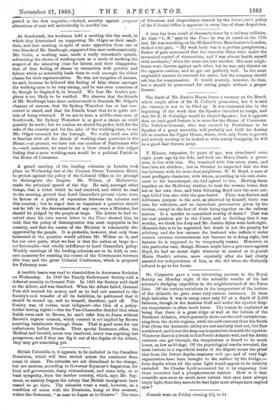F. Hinson, carpenter, 30 years of age, was abandoned some
eight years ago by his wife, and took one Maria Death, a gover- ness, to live with him. She remained with him seven years, and bore him six children, but in October he suspected that she was too intimate with his next-door:neighbour, W. D. Boyd, a man of most profligate character, with whom, according to his own state- ment to his housekeeper, she had agreed to live. Meeting them together on the Holloway station, he took the woman home, shot her at her own door, and then following Boyd into the next cot- tage killed him also with the gun-barrel. There was distinct and deliberate purpose in the acts, as admitted by himself, there was time for reflection, and no immediate provocation given by the victims, except in the fact of their being together on the railway station. Is a murder so committed worthy of death? That was the real question put to the Court, and in deciding that it was worthy, we think the Jury and Mr. Justice Bylee were both right. Hinson's fate is to be regretted, but death • is not the penalty for adultery, and the law excuses the husband who inflicts it under certain extreme circumstances not because he is doing right, but because he is supposed to be temporarily insane. Moreover, in this particular case, though Hinson might have a grievance against Boyd, he had no moral right whatever to control or to punish Maria Death's actions, more especially after she had clearly asserted her independence of him, as she did when she distinctly refused to go to his house.


































 Previous page
Previous page